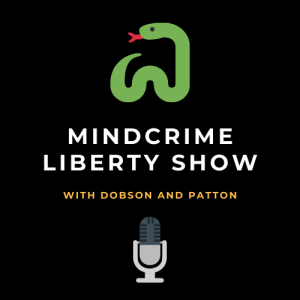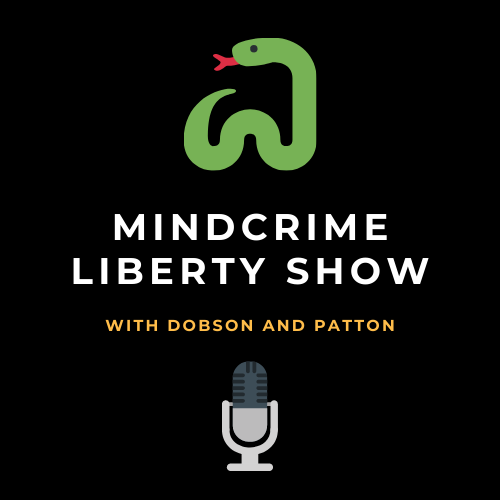
Episodes

Monday Feb 13, 2023
Monday Feb 13, 2023
The Mindcrime Liberty Show discusses, what is the nature of the good or ideal life? Are Amish farmers, McDonald's workers or the homeless living a better life than billionaires, trust fund babies and the power elite? Does work or some form of productive activity a component of a good life and make one "happier"? Is having friends and family a part of a good life or is being a reclusive hermit preferable? Is the Nozick experience machine or Zizek's joke about lemonade and pornography really a good life? Is merely consuming for base pleasures that pleasurable?

Thursday Jan 26, 2023
Ep. 120: Is selfishness a virtue? W/Rik Storey
Thursday Jan 26, 2023
Thursday Jan 26, 2023
The Mindcrime Liberty Show discusses with Rik Storey, whether seflishness is a virtue? Is Ayn Rand right? Or are the Christian and some communist critics of her right? Does not one need to care for oneself in order to care for others? Is selfishness merely the excess of necessary love to oneself? Aren't most uses of be less selfish by the state and society merely tools of more exploitation? For example, take this Big Pharma unproven j@b, or pay higher gas prices to help the environment and the Ukraine. Was Christ himself purely selfless?

Wednesday Jan 11, 2023
Who is the freest man: Boss, Employee, Master or Slave?
Wednesday Jan 11, 2023
Wednesday Jan 11, 2023

Tuesday Jan 03, 2023
Ep 118: Is free speech a Unicorn?
Tuesday Jan 03, 2023
Tuesday Jan 03, 2023

Thursday Dec 22, 2022
Ep. 117: Are landlords criminals? Is the state a landlord?
Thursday Dec 22, 2022
Thursday Dec 22, 2022

Tuesday Dec 13, 2022
Ep. 116: Can the government pull off conspiracies?
Tuesday Dec 13, 2022
Tuesday Dec 13, 2022
The Mindcrime Liberty Show discusses whether the state is really too incompetent to pull off a “conspiracy.” Libertarians routinely accuse the government of being too incompetent but this argument is incorrect. The problem with the State is that it isn’t incentivized to provide said services for the common good. On the contrary the so-called open and closed conspiracies, which it is accused of, ARE in the interest of certain sectors of the State. Since most sophisticated political theorists including Hoppe, Chomsky, Burnham, Rothbard, Preston and Carson, understand that the State isn’t some grassroots democracy, the question of conspiracies becomes a question of when, not if. The mainstream of course accuses other governments such as Putin, Xi or Saddam (as well as historically the moustache man in the Reichstag) but wouldn’t accuse their own government of it. What makes the American or British state different? The “they” could be relatively innocuous persons merely acting in their own class or career interest. Many of the “they,” just as Socrates thought in the Meno dialogue, could think it's for the good of all or their tribe. There needs to be war in Indochina or the Middle East, so one stages a false flag in order to drum up support. Satanists need not apply (although who knows). Why couldn’t “they” assassinate JFK, stage a false flag, fake a moon landing for PR or hide trafficking? The anti-conspiracy line seems to suggest that no organization can make a plan and keep it secret - Volkswagen did! The Manhattan project was a secret from Truman. This way of understanding human behavior is much more in line with Mises Human action. Humans, acting within organizations, can and do make plans, and can and do act. Some plans are of course a priori impossible but false flags and assassinations are far from impossible.

Thursday Dec 01, 2022
Ep. 115: Does mental illness exist? W/Rik Storey
Thursday Dec 01, 2022
Thursday Dec 01, 2022
The Mindcrime Liberty Show is joined by Rik Storey to discuss, does mental illness exists? Is it merely a tool which ruling powers use to isolate and medicate those who don’t fit in? Is PTSD a rational response to witnessing horrors? What exactly is “normal” or “healthy” behavior especially in the current age? Are the formal institutions of society in any position to say that? Is mental illness merely a way to get around moral culpability by labelling any unwanted action as something akin to diarrhea or a toothache? What causes mental illness if it does indeed exist? Is mental illness incompatible with a robust understanding of Christianity? If Christianity is indeed true, then would such a society have the category of mental illness?

Monday Nov 21, 2022
Ep 114: Why don’t central banks print even more money???
Monday Nov 21, 2022
Monday Nov 21, 2022

Friday Nov 11, 2022
Ep. 113: Are the British Royal family any different than the Kardashians?
Friday Nov 11, 2022
Friday Nov 11, 2022
The Mindcrime Liberty Show discusses the British Royal Family by asking, are they any different than the Kardashians? Are the royals merely attention seeking celebrities with a brand that sells branded merch to adoring fans? Did Queen Elizabeth become a kind of “girl boss” celebrity or is she the last standing member of the ancien regime? Are parliamentary politicians merely celebrities too? If this “celebrityfication” did happen, when did it happen and is this a good development? Does the monarchy still have virtues? What is the role of the royal family in Britain and the wider English world going forward?

Monday Oct 31, 2022
Ep 112: What is the purpose of fathers?
Monday Oct 31, 2022
Monday Oct 31, 2022
The Mindcrime liberty show discusses, what is the purpose of fathers? Are fathers merely sperm donors? Are fathers merely breadwinning money cows to be milked by children and wives? Are fathers a cultural killer app, to use the Niall Ferguson term? Do societies with involved fathers do better than those which don’t? Is there a tension between the idea of an involved father and a successful one? Being successful at anything seems to require a significant number of hours. As Musk jokes, nothing worthwhile was ever accomplished on 40 hours a week, let alone “part-time.” Most fathers in the nuclear family model in the industrial world work outside the home and so are functionally away from their families for much of the time. In the past the number of hours worked was even higher. Even though in death bed confessions people say they want to work less, their revealed preference and necessity seem to dictate otherwise. Why is that and can this tension be resolved? Finally, should the clergy or priestly class be single without any entangling ties of the family?
